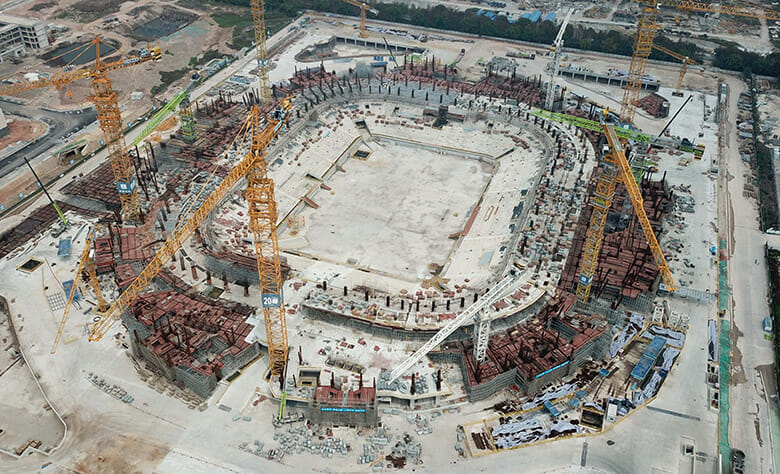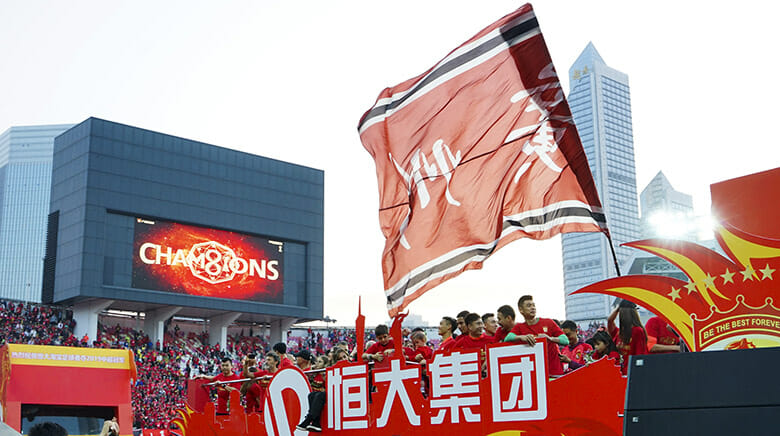
Evergrande’s football stadium under construction earlier this year (Source: Getty Images)
China Evergrande Group, the world’s most indebted developer, said late last week it will receive a RMB 5.52 billion ($818 million) refund from the city of Guangzhou for giving up the land use rights for an unfinished football stadium in the city.
In a filing to the Hong Kong stock exchange late Thursday, Evergrande said “the group’s liquidity issue has adversely affected the development of and construction on the land” in Guangzhou, with the company having originally taken on the project in the hopes of building a new home for its then league-leading Guangzhou Evergrande Taobao Football Club.
With the developer now struggling to agree with investors on a restructuring plan, Evergrande said it will transfer the land, buildings and other items associated with the stadium to the Guangzhou Municipal Planning and Natural Resources Bureau with the refund headed to an escrow account, where it will be used to settle debts related to the project
Evergrande expects to record a loss of about RMB 1.26 billion on its surrender of the Guangzhou Evergrande Football Stadium property, with the refund coming in well below the book value of the asset, the company said.
Colossus Stumbles
Evergrande had paid RMB 6.81 billion to acquire the land for project from Guangzhou authorities in April 2020, as it sought to build an 80,000 seat venue for Guangzhou Evergrande Taobao Football Club which would rank as the world’s largest football stadium.

Evergrande fans haven’t had much reason to cheer lately (Source: Getty Images)
Having secured 40 year land use rights for the retail and sports elements of the project, alongside a 50 year term for other commercial elements of the project, the company has begun work on what it described as a RMB 12 billion project immediately after securing the property.
The 150,000 square foot football edifice is being built next to Guangzhou South Railway Station, and was slated to replace Tianhe Stadium, the current home of what is now known as Guangzhou Football Club upon its intended completion date in 2022 – a target which now seems unlikely to be met.
Evergrande had said in September of last year that construction was ongoing at the stadium, however a government body took control of the project later in the year and had been marketing the asset.
Football Club in Flux
Renamed at Guangzhou Football Club in early 2021 when China’s professional league banned use of company names in football club monikers, Evergrande had purchased the team in 2010 and supported its eight Chinese Super League titles since that date.
While Evergrande’s latest statement did not mention its football club, in January, Chinese news outlet Yicai Global reported that local state-owned firms led by Guangzhou Pharmaceutical Holdings are likely to take over the team and co-manage the club.
Evergrande had paid RMB 100 million to acquire the team in 2010, and Jack Ma’s Alibaba Group bought a 40 percent stake in 2014. With the infusion of new money, the squad was strengthened and quickly won promotion to the top tier of Chinese football. From 2011 it won the Chinese Super League title eight times, including seven seasons in a row.
However, after suffering high-profile exits including those of head coach Fabio Cannavaro and Brazil-born forward Ricardo Goulart last year, the club is currently close to the bottom of the league.
Scrambling to Raise Cash
Once China’s top-selling property developer, Evergrande has been struggling since last year under the weight of more than $300 billion in debt, of which around $20 billion is held by overseas investors.
The handover of the football stadium marks the latest move by the cash-strapped developer to raise cash to pay down debts, as the developer failed to meet a promised 31 July deadline for restructuring its foreign debts.
Evergrande is also marketing its Hong Kong headquarters at a valuation of around HK$9 billion ($1.15 billion), with Li Ka-shing’s CK Asset Holdings having placed a bid for the Wan Chai office tower, according to sources who spoke with Mingtiandi last week.
With Hong Kong’s office market still hobbled by the government response to Covid-19, the Gloucester Road building is being marketed for around 28 percent less than the HK$12.5 billion which Evergrande paid to acquire the asset in 2015.
On 31 July, the firm revealed that it had lost an $1.1 billion arbitration case without naming a counterpart or the source of the arbitration claim, other than to reference an unpaid debt.
Leave a Reply